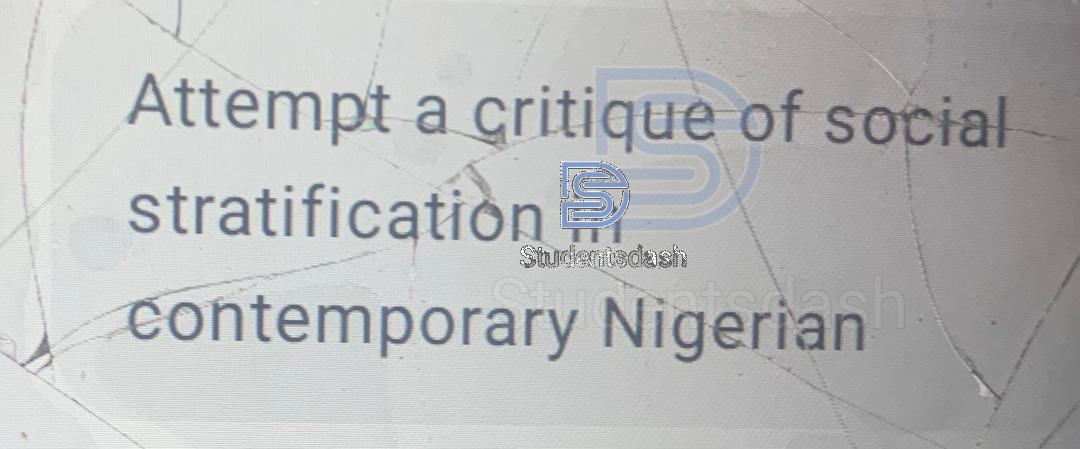ECO 271 Assignment Questions and Answers
Eco 271
Department: Economics
Assignment Questions: Explain more details on this ‘public policy towards housing and policy of public goods’
Public Policy Towards Housing and Policy of Public Goods
Public policy plays a critical role in shaping the well-being of citizens, particularly in key areas like housing and public goods. In Nigeria, access to affordable housing remains a significant challenge, and the provision of public goods such as roads, electricity, and security is often inadequate due to various economic and governance issues. This assignment explores public policy towards housing and the policy of public goods, with a focus on Nigeria’s economic environment, government interventions, and challenges.
1. Public Policy Towards Housing
Definition
Public housing policy refers to government interventions, regulations, and programs designed to ensure access to affordable and quality housing for all citizens. In Nigeria, housing remains a pressing issue due to rapid urbanization, high population growth, and poor economic conditions, making housing unaffordable for many low- and middle-income earners.
Government Objectives in Housing Policy
The Nigerian government aims to achieve the following through its housing policies:
- Increase Affordable Housing Supply – Through low-cost housing schemes and mortgage financing.
- Reduce Homelessness – By providing housing for low-income earners and vulnerable groups.
- Regulate the Real Estate Market – Preventing high property prices and unfair housing practices.
- Improve Urban and Rural Housing Development – By investing in basic infrastructure in cities and rural areas.
- Encourage Private Sector Participation – Through public-private partnerships in housing projects.
Key Housing Policies and Programs
The Nigerian government has introduced several policies and agencies to address housing challenges:
- National Housing Policy (NHP) – First introduced in 1991 and revised in 2006 and 2012, aimed at increasing affordable housing supply.
- Federal Mortgage Bank of Nigeria (FMBN) – Provides mortgage loans to citizens at affordable rates.
- National Housing Fund (NHF) – A scheme where workers contribute a portion of their salary to access low-interest housing loans.
- Mass Housing Schemes – Government partnerships with private developers to build low-cost housing estates.
Challenges of Housing Policy
Despite government efforts, several challenges persist:
- High Cost of Building Materials – Prices of cement, iron rods, and other materials continue to rise, making housing expensive.
- Poor Mortgage System – Many Nigerians cannot access home loans due to high interest rates and stringent requirements.
- Corruption and Mismanagement – Many government housing projects are abandoned due to misappropriation of funds.
- Inadequate Infrastructure – Lack of good roads, electricity, and water supply affects housing development.
- Rapid Urbanization and Slum Growth – Cities like Lagos, Abuja, and Port Harcourt face overcrowding, leading to the expansion of slums.
Possible Solutions
- Government-Subsidized Housing – Providing more low-cost housing for low-income earners.
- Strengthening Mortgage Institutions – Reducing interest rates and making housing loans more accessible.
- Improved Urban Planning – Enforcing zoning laws and preventing unplanned settlements.
- Encouraging Local Material Production – Reducing dependency on imported building materials.
- Public-Private Partnerships (PPP) – Collaborating with private developers to boost housing supply.
2. Policy of Public Goods
Definition
Public goods are goods and services that are provided by the government for the benefit of all citizens. They are non-excludable (everyone can use them) and non-rivalrous (one person’s use does not reduce availability for others). Examples include electricity, roads, security, education, and healthcare.
Government Objectives in Public Goods Policy
The Nigerian government provides public goods to:
- Promote Economic Development – By investing in infrastructure such as roads, power supply, and communication.
- Ensure Social Welfare – By providing education, healthcare, and clean water.
- Correct Market Failure – Since private firms may not provide these services at affordable costs.
- Enhance National Security – By funding police, military, and emergency services.
- Reduce Inequality – By making essential services accessible to all citizens, especially the poor.
Government Strategies for Public Goods Provision
- Taxation and Public Funding – The government uses tax revenues to fund public goods like roads, schools, and hospitals.
- Subsidies and Grants – Providing financial support for sectors like education, electricity, and agriculture.
- Public-Private Partnerships (PPPs) – Collaborating with private investors to develop public infrastructure, such as toll roads.
- Regulation and Policy Implementation – Laws and policies to ensure efficient provision and distribution of public goods.
Challenges in Public Goods Provision
- Inadequate Funding – Due to low government revenue and budget misallocation.
- Corruption and Mismanagement – Many public goods projects suffer from embezzlement and contract inflation.
- Poor Infrastructure Maintenance – Many roads, schools, and hospitals deteriorate due to lack of maintenance.
- Power Supply Instability – Electricity shortages remain a major issue despite government investments.
- Overpopulation and High Demand – Increased population growth strains available public goods.
Possible Solutions
- Improved Budgeting and Fund Allocation – Ensuring that resources are allocated efficiently.
- Anti-Corruption Measures – Strengthening institutions to prevent fund mismanagement.
- Encouraging Private Sector Investment – Allowing private companies to help develop public infrastructure.
- Better Maintenance Policies – Regularly maintaining roads, schools, and hospitals.
- Alternative Energy Development – Investing in solar and renewable energy to improve power supply.
Conclusion
Public policy towards housing and the provision of public goods are essential for Nigeria’s economic growth and social stability. While efforts have been made to improve housing accessibility and public infrastructure, challenges such as poor funding, corruption, and mismanagement persist. Addressing these issues requires better governance, stronger policies, and increased private sector participation to ensure sustainable development and improved living conditions for Nigerians.

